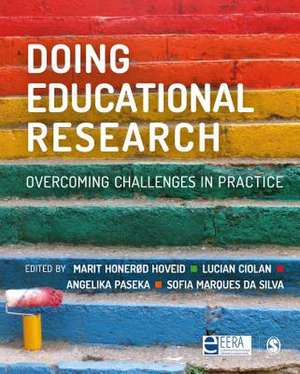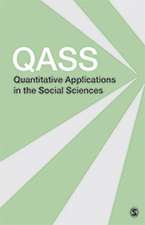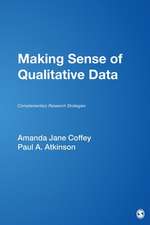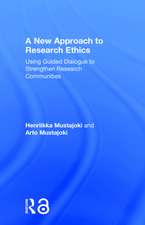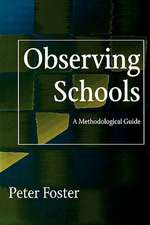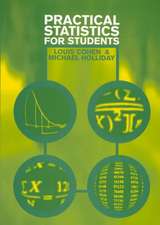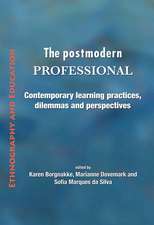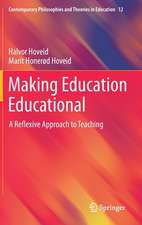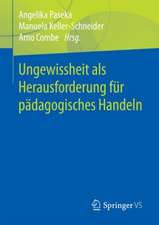Doing Educational Research: Overcoming Challenges In Practice
Editat de Marit Honerød Hoveid, Lucian Ciolan, Angelika Paseka, Sofia Marques da Silvaen Limba Engleză Paperback – iul 2019
Published in partnership with EERA, this book is:
· Realistic and informed: It explores a range of perspectives on educational research, from planning to data collection to international collaboration
· Challenging: It integrates a holistic and critical view on the process of educational research
· Culturally aware: It covers a variety of research projects from different countries and encourages you to challenge dominant perspectives in education
This is the first major English language textbook for postgraduate and postdoctoral education researchers that represents and explores the range of research traditions that exist throughout Europe and what they mean in practice.
| Toate formatele și edițiile | Preț | Express |
|---|---|---|
| Paperback (1) | 411.52 lei 43-57 zile | |
| SAGE Publications – iul 2019 | 411.52 lei 43-57 zile | |
| Hardback (1) | 814.88 lei 43-57 zile | |
| SAGE Publications – 2 iul 2019 | 814.88 lei 43-57 zile |
Preț: 411.52 lei
Nou
Puncte Express: 617
Preț estimativ în valută:
78.81€ • 81.20$ • 66.02£
78.81€ • 81.20$ • 66.02£
Carte tipărită la comandă
Livrare economică 24 februarie-10 martie
Preluare comenzi: 021 569.72.76
Specificații
ISBN-13: 9781526435545
ISBN-10: 1526435543
Pagini: 352
Dimensiuni: 186 x 232 x 24 mm
Greutate: 0.6 kg
Ediția:1
Editura: SAGE Publications
Colecția Sage Publications Ltd
Locul publicării:London, United Kingdom
ISBN-10: 1526435543
Pagini: 352
Dimensiuni: 186 x 232 x 24 mm
Greutate: 0.6 kg
Ediția:1
Editura: SAGE Publications
Colecția Sage Publications Ltd
Locul publicării:London, United Kingdom
Recenzii
"This refreshing book leaves standard methods texts behind, offering emerging researchers a truly unique set of practical insights into the complexity of methodological dilemmas and challenges they might face in the unpredictable real world of educational settings; immersing readers in diverse, authentic examples from international studies will help develop open-mindedness, criticality, intercultural awareness and reflexivity."
This collection of work by international scholars and experienced researchers within the field of social science offers fresh insights and makes a significant contribution to the burgeoning landscape of educational research. Compelling arguments based upon an eclectic range of concrete examples of empirical research drawn from multiple sites and lines of enquiry challenge the taken-for-granted assumptions, epistemological perspectives and more traditional approaches which serve to encourage readers to push the boundaries and contemplate new ways of seeing, doing, analysing, interpreting and understanding educational research. The adoption of a questioning and critically reflective stance not only enables readers to recognise the possibilities but moreover the challenges, pitfalls and lessons learned from different approaches to educational research, which are succinctly captured in researcher checklists. A recurring theme which permeates this book is the desire to engage in ethical research practice that has integrity, particularly against the backdrop of uncertainty and growing concerns about the future direction/s of educational research. Early career and experienced researchers will find this an indispensable resource.
This collection of work by international scholars and experienced researchers within the field of social science offers fresh insights and makes a significant contribution to the burgeoning landscape of educational research. Compelling arguments based upon an eclectic range of concrete examples of empirical research drawn from multiple sites and lines of enquiry challenge the taken-for-granted assumptions, epistemological perspectives and more traditional approaches which serve to encourage readers to push the boundaries and contemplate new ways of seeing, doing, analysing, interpreting and understanding educational research. The adoption of a questioning and critically reflective stance not only enables readers to recognise the possibilities but moreover the challenges, pitfalls and lessons learned from different approaches to educational research, which are succinctly captured in researcher checklists. A recurring theme which permeates this book is the desire to engage in ethical research practice that has integrity, particularly against the backdrop of uncertainty and growing concerns about the future direction/s of educational research. Early career and experienced researchers will find this an indispensable resource.
Cuprins
PART I: Getting Ready for the Unexpected
An Introduction to Challenges in Educational Research - Sofia Marques da Silva and Lucien Ciolan
Chapter 1: Doing Educational Research - Marit Honerød Hoveid and Angelika Paseka
PART II: Negotiating Research Contexts and Demands from the Field
Chapter 2: Entering a Fluid Research Field - Maria P. Figueiredo and Nelson Gonçalves:
Chapter 3. Using Photo-Elicitation Interviewing to Bridge Social Gaps - Karin Doolan and Linda Liebenberg
Chapter 4. Producing and Sharing Knowledge with a Research Field - Anja Sieber Egger, Gisela Unterweger and Christoph Maeder
PART III: Exploring Other Paths for Interpretation
Chapter 5: Doing Systematic Literature Reviews – ‘Net-Fishing’ or ‘Whale Hunting’? - Gábor Halász
Chapter 6: Doing Participatory Stories Research – Detoxing Narratives, - Sabine Krause, Gertraud Kremsner, Michelle Proyer and Raphael Zahnd
Chapter 7: Doing Multi-Level Statistical Modelling with Hierarchically Nested Samples - Tim Mainhard, Theo Wubbels and Perry den Brok.
Chapter 8: Doing Data Analysis – Collaboration, Creativity and Critique - Liselott Aarsand and Pål Aarsand
PART IV: Building a Common Ground for Understanding
Chapter 9: Discussing Sociological Gaps and Power Relations in an International Setting - Sarah Désirée Lange
Chapter 10: Addressing the Context in Cross-National Comparative Research - Herbert Altrichter, Miriam Galvin, Gerry McNamara and Joe O’Hara
Chapter 11: Organising International Collaborative Research for Social Inclusion - Rocío García-Carrión, Aitor Gómez & Javier Díez-Palomar
PART V: Bridging Research and Policy
Chapter 12: Shaping the Research Puzzle in an Intervention Project - Lucian Ciolan, Romita Iucu, Anca Nedelcu and Catalina Ulrich Hygum
Chapter 13: Navigating a Multi-Perspective, Multi-Level and Longitudinal Research - Tamara Katschnig, Corinna Geppert, Mariella Knapp, Michaela Kilian, Sonja Bauer-Hofmann and Tanja Werkl
Chapter 14: Meeting the Expectations of Different Actors at the Science-Policy Interface – Monitoring of Education for Sustainable Development in Germany - Mandy Singer-Brodowski, Antje Brock and Nadine Etzkorn
PART VI: Getting Ready for an Open Future
Chapter 15: Educational Research – a Space of Risk and Uncertainty - Angelika Paseka, Marit Honerød Hoveid, Lucian Ciolan, Sofia Marques da Silva
An Introduction to Challenges in Educational Research - Sofia Marques da Silva and Lucien Ciolan
Chapter 1: Doing Educational Research - Marit Honerød Hoveid and Angelika Paseka
PART II: Negotiating Research Contexts and Demands from the Field
Chapter 2: Entering a Fluid Research Field - Maria P. Figueiredo and Nelson Gonçalves:
Chapter 3. Using Photo-Elicitation Interviewing to Bridge Social Gaps - Karin Doolan and Linda Liebenberg
Chapter 4. Producing and Sharing Knowledge with a Research Field - Anja Sieber Egger, Gisela Unterweger and Christoph Maeder
PART III: Exploring Other Paths for Interpretation
Chapter 5: Doing Systematic Literature Reviews – ‘Net-Fishing’ or ‘Whale Hunting’? - Gábor Halász
Chapter 6: Doing Participatory Stories Research – Detoxing Narratives, - Sabine Krause, Gertraud Kremsner, Michelle Proyer and Raphael Zahnd
Chapter 7: Doing Multi-Level Statistical Modelling with Hierarchically Nested Samples - Tim Mainhard, Theo Wubbels and Perry den Brok.
Chapter 8: Doing Data Analysis – Collaboration, Creativity and Critique - Liselott Aarsand and Pål Aarsand
PART IV: Building a Common Ground for Understanding
Chapter 9: Discussing Sociological Gaps and Power Relations in an International Setting - Sarah Désirée Lange
Chapter 10: Addressing the Context in Cross-National Comparative Research - Herbert Altrichter, Miriam Galvin, Gerry McNamara and Joe O’Hara
Chapter 11: Organising International Collaborative Research for Social Inclusion - Rocío García-Carrión, Aitor Gómez & Javier Díez-Palomar
PART V: Bridging Research and Policy
Chapter 12: Shaping the Research Puzzle in an Intervention Project - Lucian Ciolan, Romita Iucu, Anca Nedelcu and Catalina Ulrich Hygum
Chapter 13: Navigating a Multi-Perspective, Multi-Level and Longitudinal Research - Tamara Katschnig, Corinna Geppert, Mariella Knapp, Michaela Kilian, Sonja Bauer-Hofmann and Tanja Werkl
Chapter 14: Meeting the Expectations of Different Actors at the Science-Policy Interface – Monitoring of Education for Sustainable Development in Germany - Mandy Singer-Brodowski, Antje Brock and Nadine Etzkorn
PART VI: Getting Ready for an Open Future
Chapter 15: Educational Research – a Space of Risk and Uncertainty - Angelika Paseka, Marit Honerød Hoveid, Lucian Ciolan, Sofia Marques da Silva
Descriere
Exploring the challenges and obstacles that need to be overcome in education research, this text offers universal guidance that the reader can apply to their own research project.
